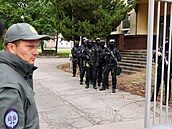BOTETI: THE RETURNING RIVER
- 10. 5. 2024, 14:10

For 20 years the Boteti River in northern Botswana has not flowed. What was once an expansive and prolific body of water gradually dried up, leaving zebras, hippos, elephants and crocodiles dependant on the few pools formed from the occasional rains.But now, for the first time in 30 years, rain has fallen in sufficient quantities hundreds of miles to the north in the Angolan highlands, sending a stream of water through the river bed. After years of extreme drought, the river has finally returned in all its glory, transforming the landscape. Filmed in stunning HD, ‘Boteti – The Returning River’ documents this extraordinary transformation and the dramatic changes it brings to the resident animals.During the years of drought, we see how desperate battles for survival play out along the dormant river, watched over by the elephants of the area. One of the few species that adapts well to the situation by carefully conserving what little water is available, the elephant is an expert at digging channels in the mud so water collects in sufficient quantities to drink.Vultures lurk ominously on the dusty banks adjacent to the pools, waiting patiently for dehydration to claim another victim. Crocodiles use caves to escape the heat of the sun and only emerge reluctantly to hunt when huge flocks of quelea birds arrive at the water. The crocs, along with numerous other species, are bound to this area because there is simply nowhere else to go. Beyond the dry river bed, semi-desert extends for hundreds of miles in all directions.With the arrival of the life-giving waters, there is a burst of activity. Fish and dragonflies soon emerge with their attendant predators and frogs appear in their thousands, attracting huge numbers of birds. The deluge also brings instant relief to the hippos by flushing out their fetid pools, while elephants celebrate by swimming and hosing each other down. Jackals and packs of wild dogs appear from nowhere to harass the drinking herds.But the most significant change occurs when the water reaches the parched wasteland of the Makgadigadi Salt Pans. Here, the coming of the flood sees flocks of pelican, flamingo and red-billed teal arrive to set up new breeding colonies.Filmed over a period of two years, this film provides a lasting and unique record of the transformation of an entire environment and contains many examples of previously unrecorded behaviour.
Hlavní zprávy

Vrtulník íránského prezidenta havaroval v horské mlze, Raísí je v ohrožení života
Íránská státní televize hlásí nehodu vrtulníku při přesunu prezidenta Ebráhíma Raísího. Stroj údajně kvůli mlze „tvrdě přistál“ v hornaté provincii Východní... celý článek

Policisté při hokeji zakročili proti muži se zbraní, vypadala jako kalašnikov
Dlouhou střelnou zbraň nesl v ruce osmnáctiletý mladík, proti němuž v sobotu po poledni zakročili policisté hlídkující během zápasu mistrovství světa u... celý článek

Slováci prověřují verzi, zda za atentátem na Fica nebylo víc lidí
Slovenské bezpečnostní složky pracují při vyšetřování středečního atentátu na premiéra Roberta Fica také s verzí, že střelec nebyl osamělým vlkem. Dříve právě... celý článek













